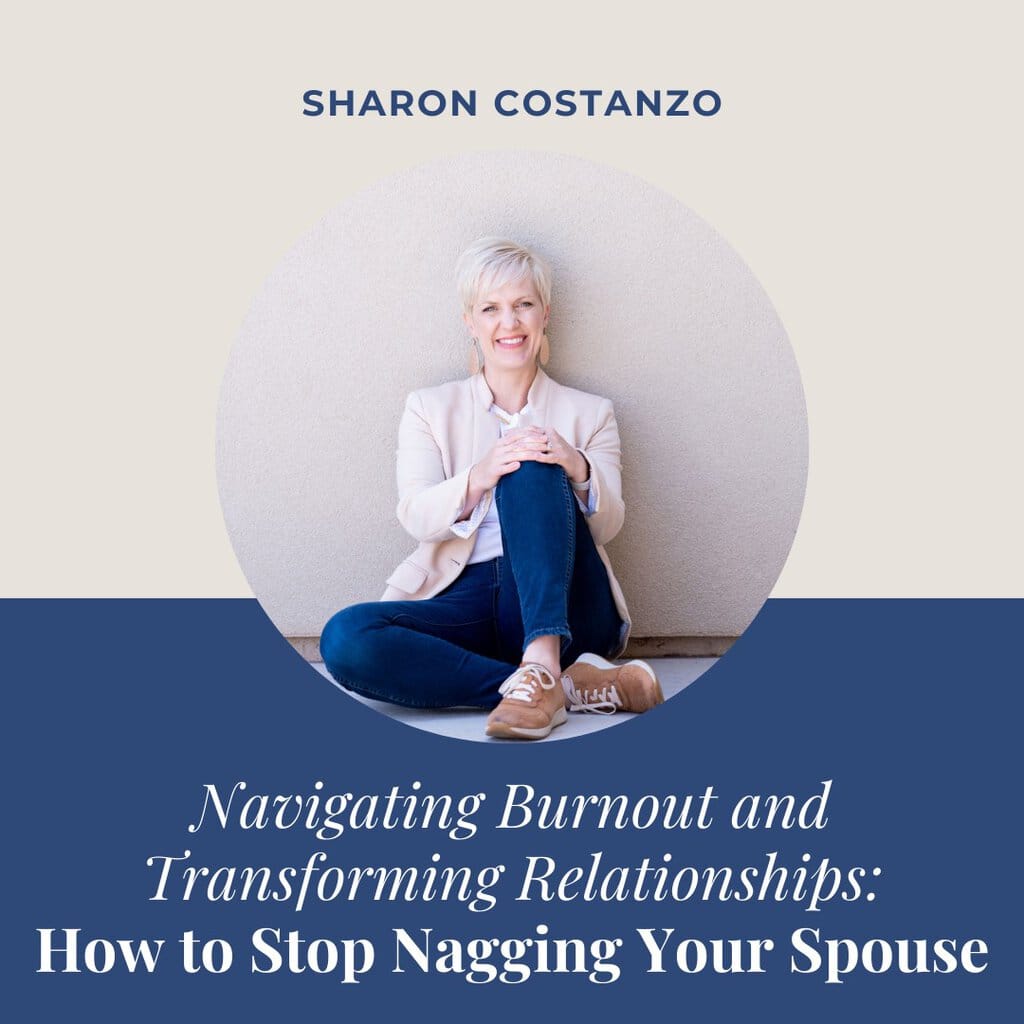Podcast: Play in new window | Download
Subscribe: Apple Podcasts | Spotify | Amazon Music | RSS | More
Navigating Burnout and Transforming Relationships: How to Stop Nagging
In a recent podcast episode, I had the pleasure of speaking with Sharon Costanzo. She is a relationship coach and host of the Respected & Connected podcast. She specializes in helping couples work through challenges as a team so that they can create a more meaningful and satisfying partnership.
Sharon shares how she went from a resentful, burnt-out mom in a “good enough” marriage to a thriving woman and mom, in a satisfying and fulfilling marriage. Her experience offers us valuable lessons in how to shift out of nagging into more collaboration and connection and I can’t wait for you to listen.
From Complaining to Constructive Communication
Sharon emphasized the importance of shifting from nagging to constructive communication. She acknowledged that while complaining might seem effective, it only fosters resentment. Sharon advised listeners to focus on clear, calm conversations about their needs, highlighting that understanding and empathy can replace frustration and blame.
Identifying and Expressing Needs
Many struggle not with expressing needs, but identifying them. Susie shared how blaming her husband was easier than understanding her own needs. She encourages listeners to self-reflect and understand their desires and emotions, which is the first step out of burnout and resentment land.
Handling Difficult Conversations
If you’re the type of person who’s tried to have this conversation before yet were met with defensiveness or anger, listen in.
It makes sense that you’d be hesitant to discuss household responsibilities due to past conflicts, yet Sharon has tips for us. She recommended setting a calm, non-confrontational tone and choosing a neutral time to talk. I find it helpful to think of us as a team working together to a common desired future rather than me telling him how my way is “right” and he had better start seeing that.
The Power of Differentiation
Sharon introduced the concept of differentiation—understanding oneself while remaining connected to others. She explained that many lack this skill, leading to dependency or conflict. Developing differentiation involves self-awareness and maintaining individuality in relationships. Listeners of this show will appreciate learning about differentiation as it relates to codependenency and a lot of the work we’re doing to be a part of interdependent relationships.
Steps Forward
Sharon gave us lots of small ways we can make big changes in our relationship. The important part is to continue to take the small (often scary) steps as that insures our relationship is growing. Settling for good enough or getting together with our friends and complaining, doesn’t change anything. One thing I like to say is complain to the person your grievance is about (in a skilled way, of course!). Alternately, complaining to our friends about a spouse who’s not there does nothing and keeps us stuck.
To find out more about Sharon and listen in to her podcast, see below for the links. My hope is that in listening to this episode and her journey, you can see that change is possible for you too! With some self-awareness, clear communication, and empathy, everything gets better.
Connect with Sharon:
Find support here:
⭐️ Ready to feel better in your relationships? Or to learn how to stop nagging and start connecting? Whether it’s with your spouse or your teen, Susie helps! Check out the Love Your Life School and see if enrollment is open here
⭐️ Want more inspiration and tips from Susie? Join her weekly email list for a dose of fun, personal stories, product recommendations, book suggestions, and more! Come join the fun here!
⭐️ Like this episode on simple health hacks? Don’t miss out on other foundational episodes of the Love Your Life Show! Get the free Podcast Roadmap here
⭐️ Let’s be friends on Instagram!
⭐️ Connect with me on Facebook, where I’m sharing glimpses of my life in Australia!
⭐️ Grab some of my favorite books and products here
⭐️ For the price of a coffee, Support Susie and the Love Your Life Show
⭐️ Have a child between the ages of 9-25? Learn the basics to support your changing child here






